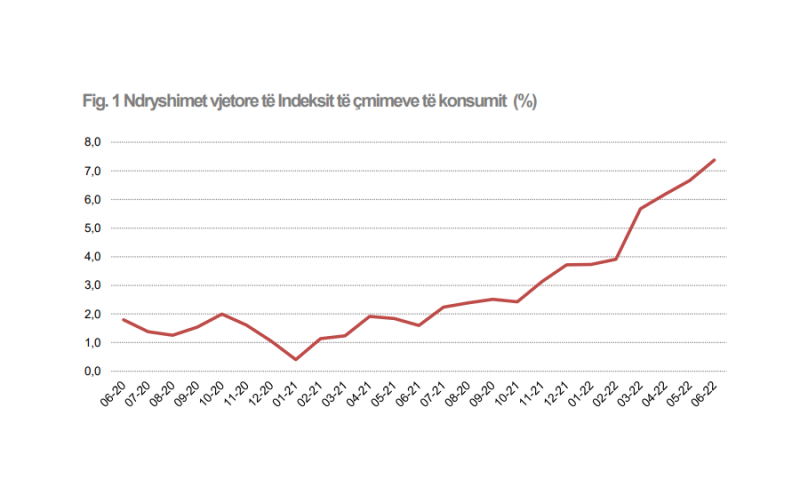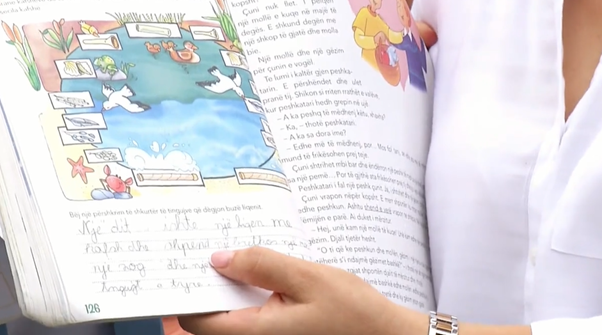The government has decided to postpone to September the second package of financial assistance for families in need. The Ministry of Finances did not revise the budget, leaving thousands of vulnerable families and pensioners without the bonus of 3,000 lek during the summer months.
Esmeralda Topi
“We are reviewing the budget and analyzing consumption. In the end of this review, we will come up with the next package for the businesses and individuals who need it the most.” – stated the Minister of Finance and Economy Delina Ibrahimaj on July 1 when the first Package of Social Resistance was over.

Minister of Finance Delina Ibrahimaj at a press conference on July 1, 2022
But even though it’s been a month since this statement, Minister Ibrahimaj has not come out to present the second aid package for the categories in need, as she stated at the beginning of July.
Faktoje learned from sources at the Ministry of Financse that the three summer months will pass without any assistance for families in need. The same sources indicate that the changes in the budget for Anti-Crisis Package 2 will be approved in September, at the start of the new parliamentary session.
Meanwhile, according to the reports of the Ministry of Finances, the state income for the first six months of the year increased by 19%. In other words, the state budget is 370 million euros more than the same period a year ago.

For several months, high prices have led to collecting more taxes for the budget, such as import VAT, excise duties, customs taxes and mining rents.
The significant increase in prices is also confirmed by the Institute of Statistics. Instat data show that Inflation for the month of June peaked at 7.4%, mainly influenced by the increase in the prices of basic food.

Graph of the consumer price index, INSTAT
With prices having increased and no shortage of money in the budget, the question naturally arises; why did the government decide not to provide budget support for families in need?
“First, the government has started to be afraid of budget revenues not increasing at the same pace. And secondly, energy needs funds.” – says the economy expert Enton Duro, adding that the budget review should have happened so that help would come to families in need.
“In this period, the prices of vegetables and fruits decrease as a result of seasonality, even though there is an increase in annual terms. This softens slightly the inflationary pressure. However, as always, the poor are totally dependent on the system and have no negotiating power, so they are happy with whatever they manage to get. Politicians know this very well and use it politically whenever necessary!”
Even the economy expert Irena Beqiraj assesses that the support should be continued, but adds that the government is forced to postpone the second Anti-Crisis Package to September in the conditions of a situation of uncertainty, the main focus of which is energy.
“If they do not have a fixed price of electricity and expect this price to increase, purchases will be very expensive and they must have money for this work because there can be no shortage of energy. On the other hand, it is not known how the debt interest rates, which are not fixed, will increase. They will have to pay off the short-term debt, issue a long-term debt domestically, and pay higher interest. Likewise, construction costs, public investments that have been foreseen are another element. For example, if Port of Durrës works start, there will be a need for a budget guarantee.” – argues Beqiraj for Faktoje.
Professor Elvin Meka, on the other hand, argues that the current economic situation dictates the need for intervention through fiscal policy.
“There are many debates and proposals, but what should be emphasized is that these types of packages are of a temporary nature, while the impact of this general increase will have a permanent effect and affect the entire economy and population without exception. Under such conditions, I would be more in favor of intervention in fiscal policy, even making structural adjustments to it in terms of food, or essential items. However, until a possible reformulation of the fiscal policy (which I doubt since the government has expressed itself categorically against its change), an “emergency” aid package for those vulnerable can be considered,” emphasizes Meka for Faktoje.
With the first package of Social Resistance, the government gave a bonus of 3,000 lek per month for pensioners, families with economic assistance and people with different abilities.

Point 2 of the first anti-crisis package
Agni Korbi is a retired former teacher from Kukësi, the poorest region according to INSTAT. He is disappointed by what he calls a lack of attention to the vulnerable.

Agni Korbi, pensioner
“How is it possible? Did the crisis pass and stop?? We have received aid for three months, but if the crisis has stopped, it’s ok, let them stop giving us aid. The crisis, though, continues and is deepening. Then people rightly ask, why did they stop giving us such aid? It was very little indeed, but it was still something for us pensioners. They should resume giving aid to support people, as they have really ended up in a very bad economic situation,” Korbi told Faktoje.
Even the Union of Public Transport has asked the government to immediately intervene to continue with the anti-crisis package or, on the contrary, increase the passenger ticket price. In the first package of Social Resistance, the government allocated 500 million ALL to compensate for the increase in the price of public transport.
“We can’t wait for September, the government must intervene immediately now because with the high fuel prices the service risks being closed.” Rixhin Qosja, president of the National Association of Urban Transport, says to Faktoje, adding that the Association continues intensive talks with the authorities for get the compensation as soon as possible.
Another point of the first package was support for farmers with tax-free oil. For this category, the government increased the amount of funding for the national scheme in agriculture by 1.2 billion lek for 2022 to help farmers by meeting their demand for reduced production costs.
The government’s decision of July 29th foresees support of 30,000 lek for each hectare planted with wheat and a fund of 500 million lek for tax-free oil, in order to increase the number of beneficiaries.
“Support for wheat is one of our requests made a year ago, but better late than never. This measure will encourage farmers to plant wheat, reducing production costs. It is a very good measure while it remains to be seen when its application starts.” – says Eduard Sharka, chairman of the Farmers’ Association, for Faktoje.
In the last assessment for Albania, the International Monetary Fund also advised the government to support families in need, which since the beginning of this year are facing the wave of rising prices.
“We see it as appropriate to replace it (the Transparency Board) with well-oriented support for the poor and the vulnerable in order to protect them from the effects of price increase.” – notes the IMF in its press release upon completion of its official visit in Albania in May of this year.
Also, the Bank of Albania has called for help for the vulnerable.
“The focus of economic policies will have to be oriented towards maintaining the stability of prices as a prerequisite for the financial stability of the country for a sustainable and long-term growth, and to help the vulnerable” – said Governor Gent Sejko a month ago , during the Bank of Albania’s annual report to the Assembly.






